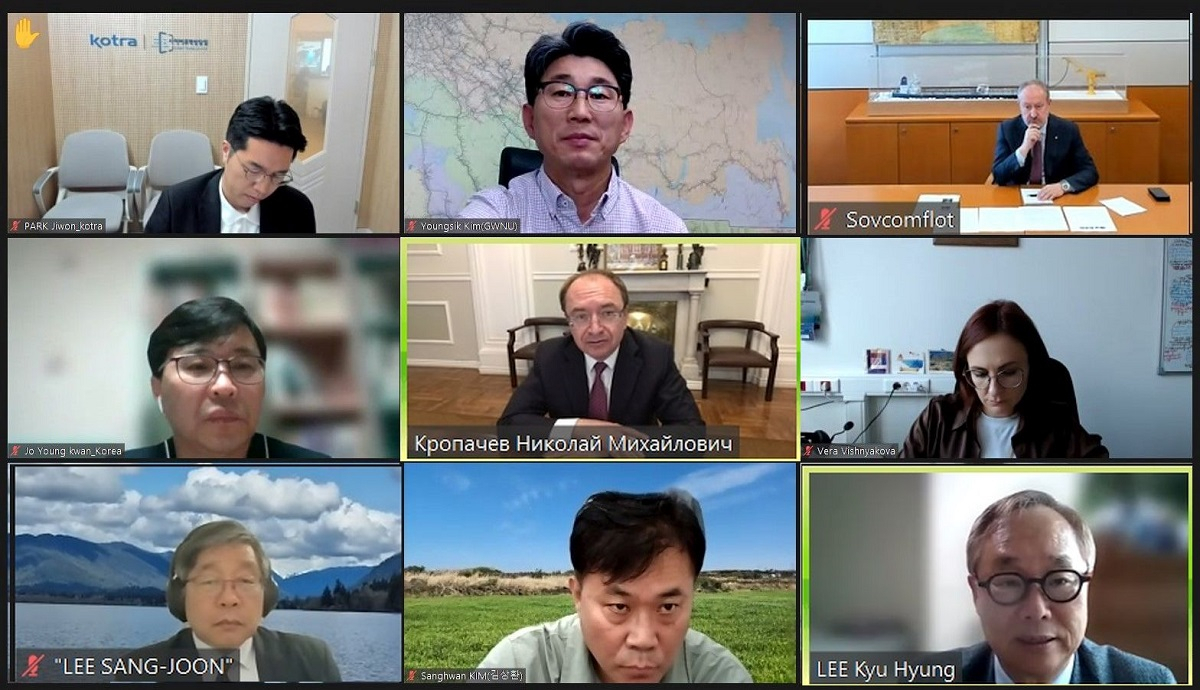Researchers from Russia and the Republic of Korea discuss joint cooperation under present-day conditions

An international conference on trade and economic cooperation has been held as part of the Korea-Russia Dialogue (KRD) Forum. The meeting was attended by researchers from both countries and representatives of the banking authorities of the Republic of Korea.
Lee Kyu Hyung, ex-Ambassador of the Republic of Korea to the Russian Federation and Chair of the Coordinating Committee of the KRD Forum on the Korean side, addressed the participants with welcoming remarks. He emphasised the importance of strengthening mutual trust between citizens of the two states through regular humanitarian exchanges; holding scholarly discussions; and expanding spheres of communication.
Nikolay Kropachev, Rector of St Petersburg University, Corresponding Member of the Russian Academy of Sciences and Chair of the Coordinating Committee of the KRD Forum on the Russian side, drew attention to the fact that more than 30 years have passed since the establishment of diplomatic relations between Russia and the Republic of Korea. Despite the fact that during these years their trade and economic cooperation has experienced periods of both growth and decline, the countries still have many points of contact in culture, economy and trade.
The conference was moderated by: Hur Seung Chul, Executive Secretary of the KRD Forum on the Korean side; Kim Young Sik, Professor at the Gangneung-Wonju National University; and Sergey Frank, Director of the KRD working group on "Economy, Trade and Resources" on the Russian side, Advisor to the Chairman of the Management Board of PAO Novatek.
Prior to the start of the experts’ discussion, Sergey Frank noted that the dialogue with Korean colleagues in the energy and shipbuilding sectors had not stopped all this time. He also expressed his gratitude to them for their efforts to find points of interaction for the benefit of the countries and peoples. ‘In challenging times, dialogue is of paramount importance,’ said Sergey Frank, Advisor to the Chairman of the Management Board of PAO Novatek. ‘A special responsibility lies on the academic elite. This is because, with their knowledge and philosophical vision, academics are better able to parry the extremes of the political climate and will not let us forget about serious strategic mutual interests.’
The discussion of the issues in Russia-Korea cooperation under present-day conditions was opened by the report of Sergei Belozerov, Professor of St Petersburg University, and Elena Sokolovskaia, Associate Professor of St Petersburg University. Their report examined in detail the trade in high-technology goods between Russia and the Republic of Korea before and after February 2022, as well as at the present stage. According to the researchers, East Asian countries used to be important suppliers of various types of high-technology products to Russia, most of which were cars and spare parts, mechanical equipment, appliances, and tankers.
At present, Russia’s dependence on reduced imports of technology is significant. This is particularly the case in medium- and high-tech industries.
Elena Sokolovskaia, Associate Professor at St Petersburg University
‘The bilateral trade in high-technology goods between Russia and the Republic of Korea is considered in view of the policies of the United States and China as important trading partners for Korea, and directly China as an important partner for Russia,’ said Elena Sokolovskaia, Associate Professor at St Petersburg University.
Jo Young Kwan, Senior Research Associate at the Export-Import Bank of Korea, presented the opportunities for Russia-Korea cooperation on the Northern Sea Route. He noted that the Arctic route is economically advantageous, including in terms of developing energy resources, and will therefore be helped forward. Year-round cargo navigation is expected by 2023.
Aleksandr Fedorovskii, Chief Research Associate at the Research Institute of World Economy and International Relations (IMEMO) at the Russian Academy of Sciences, spoke about the prospects for Russia and the Republic of Korea to adapt to the new realities in the Asia-Pacific region. The countries see China, Vietnam, Indonesia, India, and ASEAN member states among their partners. According to Aleksandr Fedorovskii, there are therefore tasks on the agenda, the solution of which will provide the necessary basis for interaction in the short and medium term: maintaining direct South Korea-Russia dialogue at the expert level; and supporting humanitarian exchanges at the people’s level and cultural contacts between relevant institutions.
Concluding the main part of the conference, Park Ji Won, Research Associate at the Korea Trade-Investment Promotion Agency (KOTRA), examined the restructuring of the monetary system and the trend towards the return of the international currency − the "gold standard". The processes of dedollarisation can be clearly seen in energy trade, and the use of the rouble and yuan in settlements between Russia and China is expanding. While earlier each country was trying to move away from the dollar on its own, now a coalition of BRICS and Latin American countries is becoming visible.
During the panel discussion, Vera Vishniakova, Associate Professor at the National Research University Higher School of Economics, drew attention to another important topic of cooperation that has a huge impact − nuclear energy.
Vera Vishniakova called for seeking ways to expand cooperation in key energy sectors and thereby develop the economies of the countries. This opinion was supported by Kim Yeong Woong, Chief Research Associate at the Centre for Korean Studies of the Institute of China and Contemporary Asia of the Russian Academy of Sciences. In his turn, he suggested developing and distributing smart modular small nuclear reactors. He also expressed hope that the Republic of Korea, which has joined the Arctic Council as an observer with Russia’s support, will take an active part in building the infrastructure of the Northern Sea Route and other important projects.

